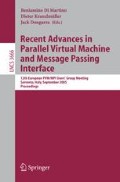Abstract
A key process in association rules mining, which has attracted a lot of interest during the last decade, is the discovery of frequent sets of items in a database of transactions. A number of sequential algorithms have been proposed that accomplish this task. In this paper we study the parallelization of the partial-support-tree approach (Goulbourne, Coenen, Leng, 2000). Results show that this method achieves a generally satisfactory speedup, while it is particularly adequate for certain types of datasets.
Access this chapter
Tax calculation will be finalised at checkout
Purchases are for personal use only
Preview
Unable to display preview. Download preview PDF.
References
Agrawal, R., Aggarwal, C., Prasad, V.: Depth First Generation of Long Patterns. In: KDD 2000, pp. 108–118. ACM, New York (2000)
Ahmed, S., Coenen, F., Leng, P.H.: A Tree Partitioning Method for Memory Management in Association Rule Mining. In: Kambayashi, Y., Mohania, M., Wöß, W. (eds.) DaWaK 2004. LNCS, vol. 3181, pp. 331–340. Springer, Heidelberg (2004)
Angiulli, F., Ianni, G., Palopoli, L.: On the complexity of inducing categorical and quantitative association rules. arXiv:cs.CC/0111009 1 (November 2001)
Agrawal, R., Imielinski, T., Swami, A.: Mining Association Rules between Sets of Items in Large Databases. In: Proc. of ACM SIGMOD Conference on Management of Data, Washington DC (May 1993)
Agrawal, R., Imielinski, T., Swami, A.: Database mining: a performance perspective. IEEE Transactions on Knowledge and Data Engineering 5(6), 914–925 (1993); Special Issue on Learning and Discovery in Knowledge-Based Databases
Agrawal, R., Srikant, R.: Fast Algorithms for mining association rules. In: Proc. VLDB 1994, pp. 487–499 (1994)
Agrawal, R., Shafer, J.C.: Parallel Mining of Association Rules. IEEE Trans. Knowl. Data Eng. 8(6), 962–969 (1996)
Bayardo Jr., R.J., Agrawal, R.: Mining the Most Interesting Rules. In: Proc. of the Fifth ACM SIGKDD Int’l Conf. on Knowledge Discovery and Data Mining, pp. 145–154 (1999)
Boros, E., Gurvich, V., Khachiyan, L., Makino, K.: On the complexity of generating maximal frequent and minimal infrequent sets. In: Alt, H., Ferreira, A. (eds.) STACS 2002. LNCS, vol. 2285, p. 133. Springer, Heidelberg (2002)
Coenen, F., Goulbourne, G., Leng, P.: Computing Association Rules using Partial Totals. In: Siebes, A., De Raedt, L. (eds.) PKDD 2001. LNCS (LNAI), vol. 2168, pp. 54–66. Springer, Heidelberg (2001)
Coenen, F., Goulbourne, G., Leng, P.: Tree Structures for Mining Association Rules. Data Mining and Knowledge Discovery 8, 25–51 (2004)
Goulbourne, G., Coenen, F., Leng, P.: Algorithms for Computing Association Rules using a Partial-Support Tree. Journal of Knowledge-Based Systems 13, 141–149 (2000)
Han, J., Pei, J., Yin, Y., Mao, R.: Mining Frequent Patterns without Candidate Generation: A Frequent-Pattern Tree Approach. Data Mining and Knowledge Discovery 8, 53–87 (2004)
Raymon, R.: Search Through Systematic Search Enumeration. In: Proc. 3rd Int,l Conf. on Principles of Knowledge Representation and Reasoning, pp. 539–550
Savasere, A., Omiecinski, E., Navathe, S.: An Efficient Algorithm for Mining Association Rules in Large Databases. In: VLDB 1995, pp. 432–444 (1995)
Toivonen, H.: Sampling Large Databses for Association Rules. In: VLDB 1996, pp. 1–12 (1996)
Author information
Authors and Affiliations
Editor information
Editors and Affiliations
Rights and permissions
Copyright information
© 2005 Springer-Verlag Berlin Heidelberg
About this paper
Cite this paper
Souliou, D., Pagourtzis, A., Drosinos, N. (2005). Computing Frequent Itemsets in Parallel Using Partial Support Trees. In: Di Martino, B., Kranzlmüller, D., Dongarra, J. (eds) Recent Advances in Parallel Virtual Machine and Message Passing Interface. EuroPVM/MPI 2005. Lecture Notes in Computer Science, vol 3666. Springer, Berlin, Heidelberg. https://doi.org/10.1007/11557265_9
Download citation
DOI: https://doi.org/10.1007/11557265_9
Publisher Name: Springer, Berlin, Heidelberg
Print ISBN: 978-3-540-29009-4
Online ISBN: 978-3-540-31943-6
eBook Packages: Computer ScienceComputer Science (R0)

